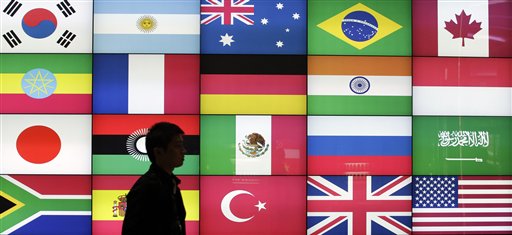As representatives of the world’s richest nations prepare to wrestle through their economic disagreements in Seoul, Korea, this week, President Obama, once again, is trying to act as a peacemaker. But he will not succeed, in part because U.S. economic policy is fundamentally, and probably purposefully, disruptive toward the global economic status quo.
The New York Times:
In a letter to other leaders of the Group of 20 economic powers, released shortly after he arrived here, Mr. Obama tried to calm the currency tensions that have roiled global economic relations, though he did not mention by name the two most prominent sources of the tension: China’s foreign-exchange interventions and the Federal Reserve’s recent decision to inject $600 billion into the economy
The juxtaposition of China and the Federal Reserve in that sentence is provocative. Critics ranging from Sarah Palin to Paul Krugman to seemingly half the finance ministers in the world have lined up to challenge Ben Bernanke’s second round of “quantitative easing” (referred to, at economist watering holes, as “QE2”). It’s either too small, too likely to cause inflation, too supportive of Wall Street asset prices, or too apt to encourage “hot flows” of capital away from the United States and into emerging market bubbles. There is no end of carping. China has been particularly upset and vocal.
But as Michael Pettis, an economist currently stationed in Beijing, argues in his latest epic analysis of economic developments along the China-U.S. axis, China’s position is remarkably disingenuous. Another way to understand Bernanke’s QE2 is as a direct response to how China manages its own economic policy.
Beijing claims that QE2 makes it impossible for other countries to protect themselves from massive capital inflows that will destabilize local asset markets. Actually, Beijing is wrong. There is a way for countries to protect themselves against QE2, but it would require that they give up intervening in their currency. In other words the only reason QE2 will create excessive monetary expansion in China is because the (People’s Bank of China) PBoC will insist on purchasing all dollar inflows at the exchange rate set by the PBoC and monetizing them. So QE2 is fairly explicitly the US countermove in the great global game of beggar-thy-neighbor.
What an impasse. China and other countries are right to claim that QE2 is likely to lead to asset bubbles outside the US, but only, as the US points out, in countries that intervene to prevent dollar depreciation, something the US is anyway eager to discourage. If Beijing is correct however in claiming, as it has for many years, that Chinese currency policies should be aimed at China’s needs, not those of the US, it is hard for them to dispute the Fed’s argument that Fed monetary policies should be aimed at satisfying the needs of the US economy, not the needs of China.
I haven’t seen Ben Bernanke explicitly defend his plan to boost the U.S. economy as a countermove against Chinese currency manipulation, but Pettis makes a convincing case for interpreting it that way. The countries that are squawking the loudest — Germany and China — are the countries with the largest export surpluses. Just today, China announced another huge trade surplus of $27 billion for the month of October. In President Obama’s letter to the G-20 participants, he warned that the world cannot and should not depend on American consumption, fueled by more borrowing, to keep on serving as the locomotive pulling the global economy. The countries with big trade surpluses need to start consuming more. By putting downward pressure on the dollar, the Fed’s QE2 offers a push in that direction. The fact that China is so upset should make U.S. advocates of a more aggressive trade policy stance on China happy.

